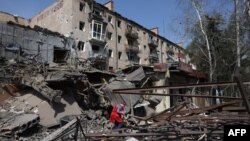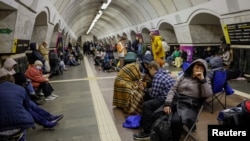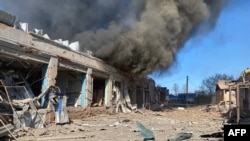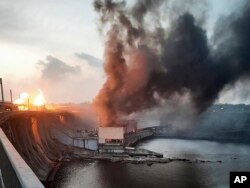Ukrainian President Volodymyr Zelenskyy called Thursday for swift action to provide his country with military aid, especially air defense systems, after a night of Russian aerial attacks that the Ukrainian military said included 42 missiles and 40 drones.
“If Russian missiles and ‘Shahed’ drones continue to strike not only Ukraine but also the resolve of our allies, this will amount to a global license for terror,” Zelenskyy said on social media. “We need air defense systems and other defense assistance, not just turning a blind eye and having lengthy discussions.”
Zelenskyy said the latest attacks targeted the Kharkiv, Kyiv, Zaporizhzhia, Lviv and Odesa regions.
“Russian terrorists have once again targeted critical infrastructure,” Zelenskyy said.
Ukraine’s air force said the country’s air defenses shot down 39 of the 40 drones and destroyed 18 of the 42 missiles.
Ukrainian electrical grid operator Ukrenergo said Russian strikes damaged its facilities in five regions.
Oleh Syniehubov, the regional governor in Kharkiv, said 10 missiles hit the city of Kharkiv, with Russian attacks targeting energy infrastructure knocking out power to more than 200,000 people.
Maksym Kozytskyi, the regional governor in Lviv, reported fires at a gas facility and an electricity substation as a result of the attacks.
The governor of Odesa, Oleh Kiper, also reported a fire at an energy facility from debris from downed drones.
Russia’s defense ministry Thursday reported thwarting a Ukrainian attack with 12 drones targeting multiple regions.
The Russian ministry said it destroyed three drones over Kursk, three over Tambov, two over Belgorod, two over Mordovia, and one each over Bryansk and Lipetsk.
Ukraine regularly targets areas close to the Ukraine-Russia border such as Belgorod and Bryansk. The strikes on Mordovia and Tambov are among the less common attacks that hit much deeper into Russian territory.
Part of a pattern
At the United Nations, a senior official expressed concern about the increase in Russian attacks, which have resulted in rising casualties.
“Since March, the large-scale coordinated attacks on critical infrastructure destroyed or damaged more than two dozen energy facilities throughout the country, including the Dnipro hydroelectric power plant,” Assistant Secretary-General Miroslav Jenca told the Security Council. “These attacks have disrupted access to electricity for millions of Ukrainians in large cities and in rural areas. Water supply was also disrupted in some locations.”
The U.N. says it has confirmed at least 126 civilians were killed and 478 injured in March — a 20% increase over February.
“The deadly trend has continued this month with daily drone, missile, rocket and artillery attacks reported across the country,” said Jenca.
Also worrisome are renewed attacks targeting Europe’s largest nuclear plant at Zaporizhzhia. On Sunday, the facility, which is under Russian military control, was directly targeted for the first time since November 2022. Drone attacks were also reported on Monday and Tuesday.
The head of the International Atomic Energy Agency said Thursday in Vienna that the attack “marked a major escalation of the nuclear safety and security dangers in Ukraine, significantly increasing the risk of a nuclear accident.”
Rafael Mariano Grossi said one of the attacks directly hit the reactor dome of Unit 6, and while the incident was serious, the damage did not compromise nuclear safety. Two other attacks were near the main reactor buildings and resulted in at least one casualty.
“Rolling the dice is not the way to do it in nuclear safety,” Grossi said.
The surge in attacks has not spared humanitarian workers. A senior U.N. humanitarian official told the Security Council that in March two aid workers were killed and 10 injured.
“Over the weekend, a humanitarian hub in Zaporizhzhia was hit, and last week a Médecins Sans Frontières (Doctors Without Borders) office in the Donetsk region was destroyed by a missile attack,” Edem Wosornu told the council. “Five civilians were injured, and MSF had to temporarily suspend critical medical activities.”
She said in recent weeks first responders have also been targeted in second wave attacks as they respond to the scene of attacks.
Peace conference
Switzerland said Wednesday it will host a high-level international conference in June aimed at ending Russia’s two-year war on Ukraine but acknowledged that Russia is unlikely to attend.
More than 100 countries have been invited to the resort town of Burgenstock for the June 15-16 conference. Swiss daily Neue Zürcher Zeitung reported that U.S. President Joe Biden, Ukraine’s key global supporter, may attend, but White House officials said no decision has been made about which U.S. officials may be there.
The conference follows a plan laid out in recent months by Zelenskyy and Swiss Foreign Minister Ignazio Cassis.
Russian Foreign Minister Sergey Lavrov warned last week that any negotiations to end the fighting could only be successful if Moscow's interests are taken into account. He called the Swiss round of peace talks a Western ruse to rally broader international support for Kyiv.
Zelenskyy said in his daily address Wednesday that Ukraine must be able to defend its airspace, its land and its waterways as part of a just end to the war. “We have no right to make a mistake in any of these aspects,” he said. There needs to be “a clear position of the world regarding the just end of this war.”
U.N. correspondent Margaret Besheer contributed to this report. Some information for this report was provided by Reuters, The Associated Press and Agence France-Presse.








